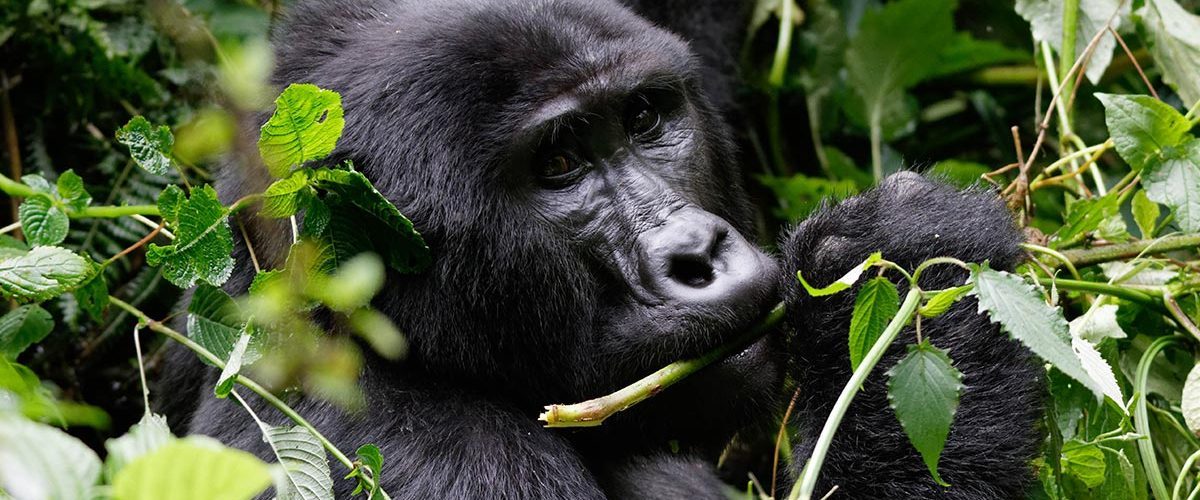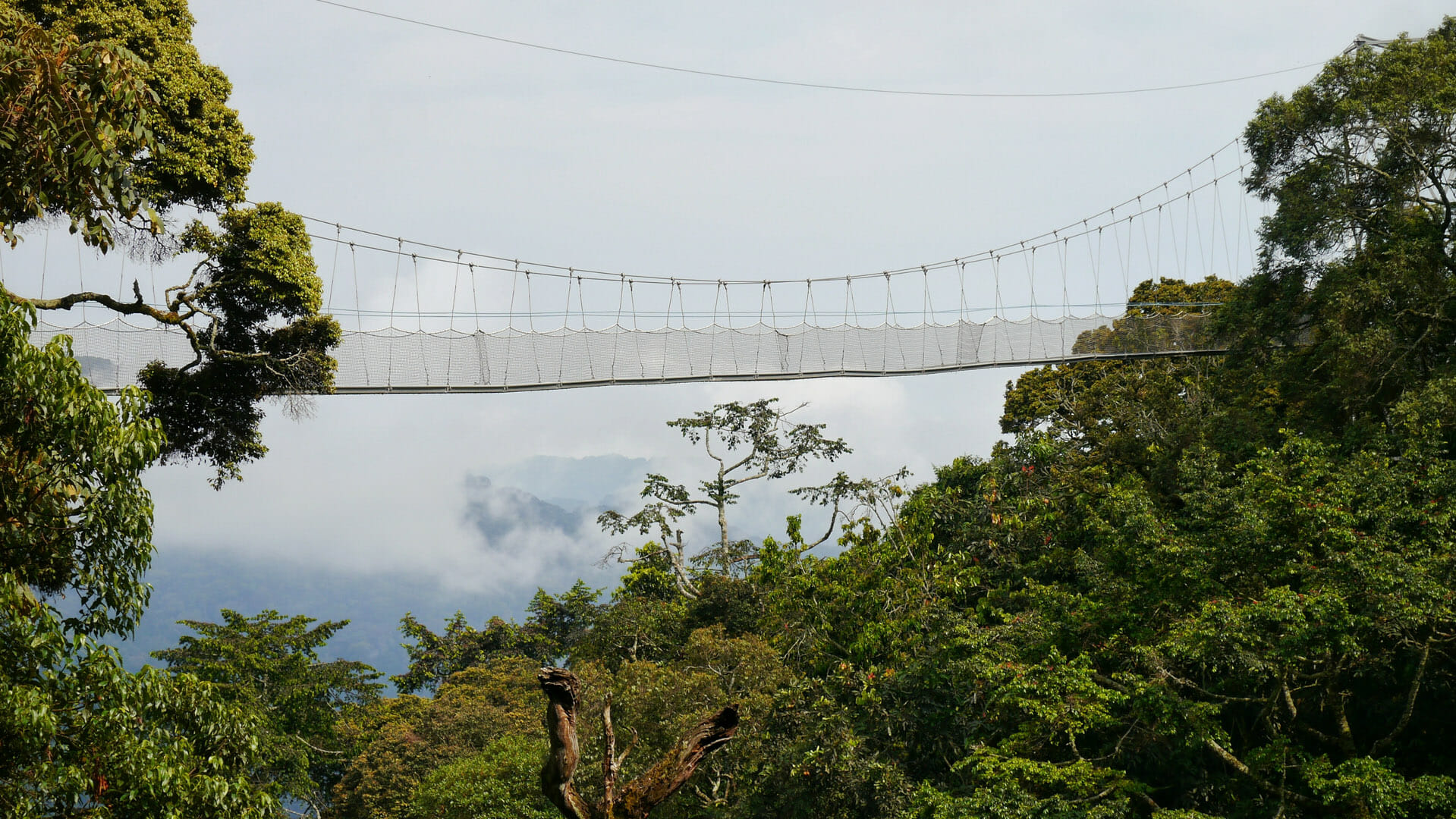Discover Rwanda - Your Ultimate Travel Guide to the Heart of Africa
Welcome to the captivating beauty of Rwanda, a land of lush landscapes, vibrant culture, and a remarkable story of resilience. Rwanda Safari is rather different from safari in most countries, in that it is primarily focused on forest rather than savannas, with primates including mountain gorillas being top of the list. Rwanda itself is a highly populous and extremely scenic and mountainous little country in central Africa. Unfortunately best known for the 1994 genocide, the country has tried very hard to move on and the shadow cast is no longer so overwhelming. The main reasons to come here is to the mountain gorillas to the north of the country. There is also a good deal of very pretty mountain and lake scenery, plus the opportunity to see chimpanzees in the south.

We divide Rwanda into six separate areas, each with their own specific character and reason to visit
The Virunga Mountains ...
lie the north of the country and constitute the one of prime areas for viewing mountain gorillas in the wild, which is naturally the prime focus for almost all trips.
The Nyungwe Forest ...
lies to the southwest of the country and is the main area for viewing chimpanzees in the wild.

Lake Kivu ...
is a scenic area to the west of the country, through which it is necessary to pass when connecting these two primate areas.
Kigali ...
is the capital city and main transport hub. The majority of Rwanda trips need to overnight here at some point in order to connect with international flights.
is a small town in the centre of the country which is best known for its genocide memorials and which can be visited on the way through, without the need to overnight.
Akagera ...
is a relatively remote national park to the east of the country, the only area to offer a more conventional savannah style safari, although relatively low-key compared with the major wildlife reserves elsewhere in East Africa.
Tips
Here are a few tips on issues relating to safari travel in Rwanda
Passports and Visas
All visitors are required to be carrying a valid passport with at least six months remaining between the date of departure from the country and the date of expiration and sufficient blank pages for stamps and visas. Travellers holding passports from the following countries do not require a visa … Burundi, DR Congo, Germany, Hong Kong, Kenya, Mauritius, South Africa, Sweden, Tanzania, Uganda, UK, USA. All visitors not requiring a visa are supposed to fill in an entry facility application form on the website www.migration.gov.rw and submit it online. Customs officials will usually have a copy of this form on their desk when you arrive, which speeds up the process. Although this is in theory obligatory, guests who have not submitted this form in advance have still been able to enter the country, although sometimes with a slight delay whilst alternative forms are completed. For those requiring a visa, we strongly recommended that you obtain this in advance as some international airlines will not let you board without it. Applications can be submitted online at the following website and the process should take about a week. Refer to the links below. You do not need to take additional passport photos with you. If you are asked on your Visa Application or Entry Certificate for ‘local contact details’, you can simply put the details of your first lodge and the phone number provided on your confirmation paperwork. Be sure that you passport is stamped with the correct departure date or you could encounter serious problems. We cannot be held responsible for the accuracy of this information. Please be sure to check for updates from the relevant authorities … London : for UK and Europe … www.rwandahc.org Washington : North, Central and South America … www.rwandaembassy.org Please note that getting a visa on arrival can involve waiting in line for a period, which can be quite tedious after a long flight. You may therefore consider using a specialist agency to help you get your visa in advance, although there is an additional cost involved. Our customers from the US particularly recommend … www.travisa.com
Money
The currency in Rwanda is the Rwandan Franc. Approximate exchange rate : $US 1 = RWF 600. This cannot usually be exchanged back into hard currency, so whatever you change you will have to either spend, give away or take home. It is worth noting that your on-the-ground expenditure in most parts of Africa should not be as high as you might be used on other trips since all of your accommodation is pre-paid, with many of your meals and activities also being included. We recommend taking a modest amount of cash US$, a small proportion of which you can change into local currency. Then back this up with debit and credit cards. Virtually all major cash payments can be settled in US$. Note that some US$ banknotes may not be accepted due to the high levels of counterfeit currency in circulation in Africa. We recommend that you only travel with US$ bills dated 2006 or later. A small amount of RWF can come in handy for small purchases at roadside stalls and stores. Exchanging US$ for RWF is possible in most locations, although exchange rates will vary. Larger, newer and better condition US$ bills generally attract a better exchange rate. Other hard currencies can be used, notably Euro, although may be subject to more unfavourable rates of exchange. Credit and debit cards are now accepted at most major stores and lodges and can be used to make payments. Virtually all locations charge a significant premium for using a card, 5% to 10% is common, higher rates in excess of 25% can be encountered. Travellers checks are no longer widely accepted. It may be significantly easier and cheaper to carry cash, but this does obviously heighten the risk of loss or theft. Refer to the section on crime for more information. There are very few cash machines or ATM’s, except in the major urban centres, where banks can also be found. If you ever run out of money, then your safari operator or lodge owner should be able to bail you out, with our assistance where necessary. When trying to assess exactly how much cash to take, most people seem to settle on somewhere between US$50 and US$200 per person per day. The more you take, the more you are likely to bring back home with you. It is more a case of how much you feel comfortable carrying. Note that your largest expenditure is likely to be tips, which could exceed US$25 per person per day.
Security
Generally speaking Rwanda is a safe place to visit, although travellers should make themselves aware of any issues.
Electricity
Socket outlets are almost universally the European two round pin variety, although you may also encounter South African three round pin sockets, both 230V/50Hz. Most good lodges provide universal adaptors, although we always recommend bringing your own.




